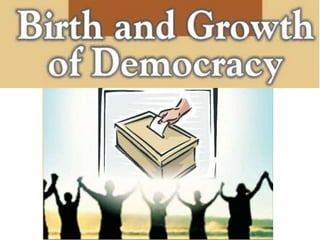
Birth of democracy
- 2. DEMOCRACY A CONCEPTUAL UNDERSTANDING • While some of the Greek city states had regimes that had Democratic aspects, Modern Democracy only dates from the late 18th century. • Democratization is one of the most important concepts and trends in Modern Political Science. • To be considered Democratic, a country must choose its leaders through fair and competitive elections, ensure basic civil liberties, and respect the rule of law.
- 3. • The opinion and choice of the people is paramount in a Democracy. • Thus it was rightly stated by Abraham Lincoln that ‘No man is good enough to govern another man without his consent.’ • Jonathan swift also said ‘All government without the consent of the governed is the very definition of slavery.’ • According to Abraham Lincoln, ‘Democracy is seen as a form of government by the people, for the people and of the people.’
- 4. • There are many other countries like Libya, Cuba, North Korea, Saudi Arabia, China etc. that do not have Democracy in their country. Many of the Non- Democratic countries witness Pro-Democracy rallies and movements. • Hence, it becomes important for us to understand the meaning of the term “Democracy”. • To understand the meaning of Democracy we need to look into the definition of Democracy as given by Abraham Lincoln . • He defined it as the ‘Government of the people, by the people and for the people’. • In a Democracy the supreme power is retained and exercised by the people.
- 6. • The word Democracy comes from a Greek word ‘Demokratia’. • In Greek ‘demos’ means people and ‘kratia’ means rule. • In simple terms, Democracy is rule by the people. • It is a government by the people in which the supreme power is vested in the people and exercised directly by them or by their elected representatives chosen after a free and fair election. • Democracy is thus, a form of government where people have an equal say in the decisions that affect their lives.
- 7. • DEFINITIONS • Democracy is the “Rule by the people” where ‘the people’ includes all adult citizens and ‘Rule’ means that public policies are determined either directly by vote of the electorate or indirectly by officials freely elected at reasonably frequent intervals and by a process in which the value of each vote is the same. –Pennock • “Democracy is a state where the people are sovereign and guided by laws of its own making, and where the people do by themselves everything that is possible to do, and through delegates, everything that is not.” -Robespierre • “Democracy is governance by leaders whose authority is based on a limited mandate from universal electorate that selects among genuine alternatives and has some rights to political participation and opposition.” -Danziger
- 9. • The definition of Democracy helps us to separate it from other forms of government. • For example, in Myanmar there is military rule (Dictatorship) and these army rulers are not elected by the people. • Similarly, the rulers of Saudi Arabia rule over the people because they happen to be born in a royal family (Monarchy). • On the contrary, Democracy is characterized by formal equality of rights and privileges.
- 13. EMERGENCE AND EXPANSION OF DEMOCRACY • Democracy in the Greek city states • The term Democracy first appeared in the Greek political and philosophical thought. • The Greek city state of Athens established the first Democracy in 508 BC. • The ancient Greeks referred to themselves as citizens of their hometown - their city-state. • Each city-state (polis) had its own goals, laws and customs. • Ancient Greeks were very loyal to their city-state.
- 15. • In Athens, every year 500 names were drawn from all the citizens of Athens who were to serve as law makers for a year. • All the citizens of Athens were required to vote on any new law that this body of 500 citizens created. One man, one vote, majority ruled. • Women, children, and slaves were not considered citizens, and thus could not vote.
- 17. The story of Modern Democracy • The stories of Modern democracy began at least three centuries ago. • The emergence of Modern Democracy is linked with Europe. • The two revolutions that contributed to the development of Democracy are the Glorious revolution of the 17th century in England and the French Revolution of the 18th century in France.
- 18. • The Glorious revolution laid the foundation of the first democratic principles of the Rule of Law. • Earlier it was believed that the king was the ‘representative of the God’ and that the King’s wishes were the law. • The people strongly protested the idea and dethroned King James II of England. • They passed the Bill Of Rights which firmly stated that the country should be governed by the laws passed by the people and not by the whims of the king.
- 20. • The French Revolution took place between 1789 and 1851. • In the revolution King Louis XVI was executed . • It was decided that the country should be ruled by the laws passed by the people. • It laid down the ‘Declaration of the Rights of Man’ which highlighted that liberty, Equality etc. were important in a Democracy. • In 1792, France became a Republic.
